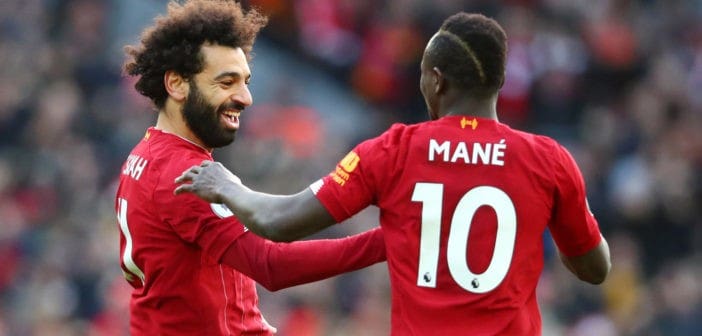It was quite possibly the strangest Premier League season to date. The table saw ‘smaller’ clubs finishing at record highs, and the so called ‘larger’ clubs struggle. On top of that, there were the three elements that defined the season, Liverpool, Covid, and VAR.
Liverpool
As a manager, you live and die by statements you make, and when Jurgen Klopp joined Liverpool in October 2015, he made a pretty bold statement:
“Please give us time to do the work but when I sit here in four years I think we may have one title.”
Last season they achieved this, with an excellent Champions League victory. This eased the pain of missing out on their first ever Premier League title by a point. Their determination to avoid this disappointment once again, was enough of a flame to set them alight, for what was an unstoppable charge towards the title this year. And boy were they immense this season.
The stats don’t lie when it comes to Liverpool, 32 wins, only three losses, the fewest goals conceded, and finishing 18 points clear of Manchester City, is quite a season. It was a drive and determination that the Premier League has not seen for a long time, Pep Guardiola summed it up:
“They played every single game like they could not lose one game”
Even after ten games, it was clear that this season was going to be different for Liverpool, they were six points clear, and yet to lose. In fact, it took until their 28th match to finally lose. But what was it about this team that made them so relentless? In short, everything,
All across the park, they were solid. At the back, Alisson kept 13 clean sheets, coming joint 3rd for the season. That is no mean feat, but when you consider he only played 29 league games, due to injury at the start of the season, it makes it even more impressive.
The clean sheets, and low goals conceded are down to the solid defensive unit, that once again proved their worth, Andy Robertson, Trent Alexander-Arnold and Virgil Van Dijk made up three of the key members of this defence. They retained the ball well, made very few mistakes, and limited the number of attempts at goal. These three also finished in the top 10 most completed passes for the season, with Van Dijk taking home the prize by completing 680 more than the next best competitor.
Going forward, Trent, Robertson and Salah finished 2nd, 3rd, and 4th respectively when it came to assists, only bested by Kevin De Bruyne, although I think we can forgive them that. Alexander-Arnold managed over ten assists for the second season in a row, with Klopp giving him possibly the biggest compliment he could pay a player:
“I have known Trent Alexander-Arnold since he was 17 years old. He had power for around 60 minutes, he was a big talent but we were not sure he could do it physically. Now he is a machine—so he is a big surprise”
In front of goal, Mane and Salah continued in their friendly battle of ‘who can score the most’, however these were the only two players to hit double figures. This is something that may need looking at for the future, as an injury to either, takes a large chunk of goals from the team. To put it in context, Man City had five players score over ten goals, and United had three.
Overall though, it was a season without fault. This team will go down as one of the best to win the Premier League, and rightly so. Klopp has already turned his attention to next season, and making sure that they weren’t a one season wonder. It won’t be easy, City will be out to prove a point, Man United looked sharp after the restart, and Chelsea have made some big signings already. Not to mention Arteta and Mourinho, who will be looking at the top four.
Covid
The word we all cringe at when we read. Covid-19 has provided us with a season like no other. The last set of fixtures before lock-down came on March 9, giving us just over three months break before fixtures resumed on June 17. It was unanimously decided by managers and players that the break was the best course of action to take, as player, and spectator safety comes first. Many managers spoke of how they wanted it to be fully safe for players to return, as it would be difficult to maintain social distancing on a pitch. Graham Potter was very vocal about this:
“If there is a corner and 20 players are in the penalty box in a small and confined area, then that is something we have to discuss.”
“We are guided by the authorities and we want to do the right thing for the health of the nation.”
“Those things are there not because people want to stop us playing football.”
“It is because people are dying and we have to be very serious about that.”
Before the pause, players reduced physical contact with other players, by not shaking hands, and following guidelines and advice from club doctors and medical teams. This was short lived, with matches ending just before the UK entered lock-down. Many were unsure whether football would indeed resume, leaving many speculating what was the best way to finish the season. Thankfully, we did not have to see PPG, or a null and void season occur, much to the delight of many.
So what happened just before the restart? Players were given training regimes, to keep up their fitness levels, should the season return. Many of these were put on social media, for fans to see they were still working hard. Every staff member had to be tested, to ensure nobody was bringing Covid into the clubs, before training could resume. Once clear, Covid rules and regulations meant that players had to gradually resume to training, and follow a lot of different rules to keep safe. No contact training, bringing your own kits and not being allowed in buildings were some of these ways.
Frank Lampard stressed that it would be a slow process, and that they would await how football would resume.
“It’s been good to get some work into the players, it’s individual work. This might be a difficult process or a slow process, safety has to come first. Once we get over phase one and see what phase two might look like and beyond that then we can think about getting games back, albeit behind closed doors.”
On the field, teams proved to be a real mixed bag. Teams like Southampton impressed, finishing third in the post restart table, whereas Leicester struggled to keep their good form, finishing 16th on the post restart charts. Another team that really did not get going was Sheffield United, who picked up ten points from ten games, seeing them miss out on a European place.
It was strange to watch, empty stadiums, fake crowd noises (that did improve over time), and players staggering their entrance to the pitch, were all new things that fans have not seen before. Despite the strange circumstances, it was great to see football back, and we were treated to some great matches too. The exciting race for Europe, and race to avoid relegation kept us all enthralled.
We only have six weeks until it all starts again. No doubt we will be watching from home, with the same measures being taken, but it’s football, and I will take it as I can right now.
VAR
Where to start with VAR? I think I will pass over to some of the Premier League managers to explain their thoughts. Dean Smith summed up what many of us have thought with some of the decisions made:
“I can understand Jon getting it wrong, he’s on the pitch, but that goes to VAR and I don’t know what they’re looking at.”
Jurgen Klopp put our feelings into words:
“I really would like to think that three people watch it – a ref, the VAR and another VAR and they should find the right decision in the end.”
And finally, Brendon Rodgers did not mince his words when talking about an apparent incorrect decision:
“Everyone can see it wasn’t a penalty,”
“These moments are game-changing moments. Whenever you are fighting at the top end or bottom end, these are crucial decisions. It will disappoint the managers concerned.”
The worst part about all of this, is that all of these quotes are taken from the same day, (July 10 2020) when fans and pundits alike, all agreed that VAR got three penalty decisions wrong in one night. It simply was not good enough.
It is easy to say that the problem is with VAR, but it isn’t, the problem has been with those operating the technology, which barring a nightmare of a moment in the Sheffield United vs Aston Villa game, has always worked. There has been a lack of cohesion, with different interpretations of rules being perceived, and the odd offside given due to an armpit, knee, and a Michail Antionio lying flat on the ground.
Many of us feel that referees should make use of the video screen on the side of the pitch. When Eddie Nketiah was shown a red card, VAR spent a long time rewatching, and deciding on a decision, however when referee Chris Kavanagh watched the replay twice, he had made the decision, surely if the referee can make the decision that quickly watching a replay, it would be better to see them make the decision.
There needs to be a level of consistency, which Pep Guardiola spoke about all the way back in August 2019:
“If it was hands it was hands, the decision is made in London so there’s nothing I can do or say about it. We could do with a little more consistency, though”
I am remaining optimistic, that many of the creases will be ironed out ready for the start of the 20/21 season. It is a big hope, but surely it can’t get more controversial, can it?
Follow us on Twitter @ProstInt
EPL
English Football
![Prost International [PINT]](https://prostinternational.com/wp-content/uploads/2021/08/PINTtFontLogoRoboto1536x78.jpg)



